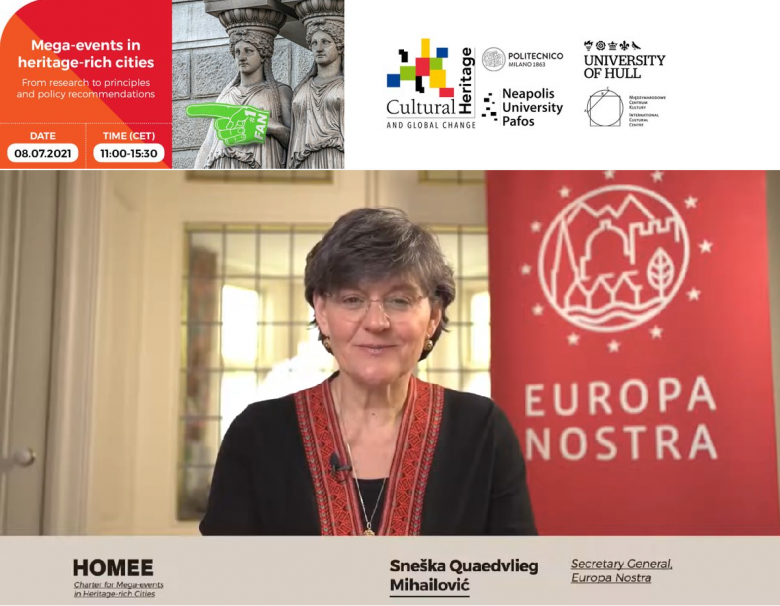Europa Nostra endorses the Charter for Mega-events in Heritage-rich Cities
On 8 July, the Secretary General of Europa Nostra, Sneška Quaedvlieg-Mihailović, contributed to the online Conference “Mega-events in heritage-rich cities: From research to principles and policy recommendations” which was part of the JPI Cultural Heritage funded project “HOMEE: Heritage Opportunities/threats within Mega-Events in Europe” and aimed to introduce and launch the Charter for Mega-events in Heritage-rich Cities.
How can cities rich in culture host mega-events without putting their own heritage at risk? How can mega-events become effective ways to promote and protect tangible and intangible heritage? The Charter for Mega-events in Heritage-rich Cities responds to these questions. The Charter consists of 13 key principles which represent its core values and are structured within the four themes: context matters, planning legacies, inclusive governance, communities and identities. These principles are supported by more detailed guidelines and 51 recommendations aimed at policymakers, as well as event organisers, heritage officials and the local community to take full advantage of the opportunities offered by mega-events, without compromising their cultural heritage and local communities. The accompanying snapshots section provides concrete examples of each of the 13 principles, presenting the cases in which they were observed.

While endorsing the Charter on behalf of Europa Nostra, Sneška Quaedvlieg-Mihailović stated: “The Charter breaks new grounds and provides further inspiration for policymakers at all levels to ensure proper safeguard and management of Europe’s rich tangible and intangible heritage. It clearly delivers principles and recommendations for mega-event plans to be implemented in such a way that they do not put heritage at risk, and also to actively involve the many heritage stakeholders and local community to maximise the contribution of cultural heritage to sustainable development and to the wellbeing of citizens. Its wide-ranging and integrated approach makes the Charter a concrete tool for sustainable and responsible cultural tourism and for an innovative heritage policy in those cities deciding, programming and delivering mega-events.”
The Charter is based on a multi-year study of cultural mega-events across Europe. It derives from the findings of the research project “HOMEE – Heritage Opportunities/threats within Mega-Events in Europe” funded by the Joint Programming Initiative (JPI) on Cultural Heritage and composed by an international multi-disciplinary group of researchers from the Politecnico di Milano, University of Hull, Neapolis University Pafos and International Cultural Centre working in the urban planning, cultural heritage preservation and mega-event planning fields.
The 8 July online Conference “Mega-events in heritage-rich cities: From research to principles and policy recommendations” was composed of two sessions. In the morning, Davide Ponzini, Project Leader of the HOMEE Research Project at the Politecnico di Milano, presented the Charter before the Roundtable discussion Putting the Charter into use moderated by Julia Georgi Neapolis of the University Pafos and gathering Ana Kočegarova, Head of Programme, Kaunas 2022 European Capital of Culture, Maria Panayides, CEO, Eleusis 2023 European Capital of Culture, Krzysztof Maj, Director General, Culture Zone Wrocław; Director, Wrocław 2016 European Capital of Culture and Marco Edoardo Minoja, Cultural Director, City of Milan.
The launch of the Charter took place in the afternoon by Jacek Purchla, Founder of the International Cultural Centre in Krakow, – who is also Europa Nostra Vice-President – and a roundtable discussion entitled “Mega-events and heritage policy in post-Covid cities moderated” by Joanna Sanetra-Szeliga from the International Cultural Centre. The discussion gathered a remarkable group of European experts, including Robert Piaskowski, Plenipotentiary of the Mayor of Krakow for Culture, on behalf of the Organization of World Heritage Cities, Jordi Pascual, Coordinator of the Secretariat of the Committee on Culture of United Cities and Local Governments, Maria Gravari-Barbas, Professor, Paris 1 Panthéon-Sorbonne University; Director of the “Tourism, Culture, Development” UNESCO Chair and Sneška Quaedvlieg-Mihailović, Secretary General of Europa Nostra.
Europa Nostra’s Secretary General highlighted the vital role of cultural heritage in Europe’s recovery plan and its many contributions to the EU Green Deal, as emphasized in the recent policy paper “European Cultural Heritage Green Paper “Putting Europe’s shared heritage at the heart of the European Green Deal” produced by Europa Nostra in collaboration with ICOMOS and the Climate Heritage Network. During her intervention, Europa Nostra’s Secretary General stressed that this unprecedented crisis is also an unprecedented opportunity for rethinking our way of life which calls for unprecedented mobilisation and action.
On 3 April 2020, Sneška Quaedvlieg-Mihailović gave the keynote speech “Mega-events in Heritage-rich Cities: A Challenge for Europe” to introduce the “Mega-events in Heritage-rich Cities” online workshop organised by the HOMEE project. This one-day workshop – which engaged about twenty experts and policy makers from across Europe in a discussion regarding the issues of governance, planning, urban effects and long-term legacy of mega-events – was the first step in drafting the Charter for Mega-events in Heritage-rich Cities.
Watch the video recordings of the July 8 webinar online
Morning session: youtu.be/UtwodqyCVwA
Afternoon session: youtu.be/thVAvYvLhII
Watch the video introducing the Charter
youtube.com/watch?v=J3ZkQt2oSms






